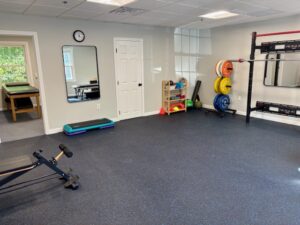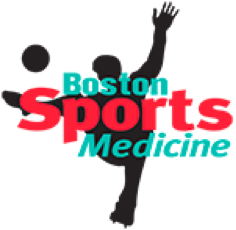© 2025 Boston Sports Medicine. All rights reserved.
From Rotator Cuff Rehab to Peak Performance: Shoulder PT in Wilmington

Shoulder pain—especially from rotator cuff injuries—can interrupt even the most routine movements, let alone athletic performance. At Boston Sports Medicine’s Wilmington clinic, physical therapy goes beyond surface-level recovery.
With expert guidance, advanced modalities, and personalized care, patients rebuild mobility, restore strength, and recondition their shoulders for daily life and high-level performance. The first step? Understanding how this part of your body really works.
Understanding Your Shoulder’s Journey: From Injury to Peak Performance
Your shoulder’s performance relies on the coordinated effort of bones, tendons, ligaments, and muscle—particularly the rotator cuff.
Whether you’re recovering from surgery, managing overuse, or bouncing back from trauma, targeted physical therapy starts by restoring this foundation.
The Anatomy Behind Peak Performance
The rotator cuff’s role goes beyond stability—it allows for controlled, powerful movement.
After injury, these muscles must be retrained to work together efficiently to prevent setbacks and optimize performance.
The Rotator Cuff’s Role in Performance and Recovery
The rotator cuff includes four muscles: supraspinatus, infraspinatus, teres minor, and subscapularis. When even one of these is impaired, shoulder mechanics falter.
Therapy focuses on restoring their strength and control using evidence-based techniques designed to rebuild coordination and prevent re-injury.
Common Conditions and Their Path to Full Recovery
Physical therapy plays a critical role in recovering from issues like rotator cuff tears and impingement.
Each condition presents unique movement limitations, but the goal is consistent: reduce pain, restore function, and return safely to activity.
Rotator Cuff Injuries: From Rehabilitation to Strengthening
Rehab starts with pain and inflammation management, then gradually moves to motion, strength, and sport-specific retraining.
Each phase is tailored to your condition and goals, ensuring progression without overload.
Stages of Rotator Cuff Recovery and Performance Restoration
- Phase 1: Pain management and inflammation control
- Phase 2: Guided mobility restoration
- Phase 3: Functional strength and motor control
- Phase 4: Performance training and return to activity
By following this progression, you recondition your shoulder for long-term performance.
Frozen Shoulder and Impingement: Restoring Full Range of Motion
Both adhesive capsulitis (frozen shoulder) and impingement limit motion and disrupt shoulder mechanics.
PT addresses these issues with manual therapy, mobility work, and targeted strengthening to relieve restriction and correct faulty movement patterns.
Whether stiffness or weakness is the root cause, therapy helps restore smooth, functional motion—and prevents symptoms from recurring.
Evidence-Based Treatments for Optimal Function
At Boston Sports Medicine’s Wilmington clinic, rehab is grounded in proven, movement-based techniques and expert hands-on care.
Manual therapy reduces pain and restores joint function, while targeted exercises based on the McKenzie Method guide recovery.
Each plan is tailored to your condition, helping you regain strength and mobility with clarity and purpose.
Manual Therapy and Hands-On Treatment
Manual therapy is a cornerstone of shoulder rehab, especially for patients dealing with stiffness, overuse, or post-operative recovery.
Our therapists apply techniques like joint mobilization and soft tissue release to restore movement and reduce pain, backed by clinical evidence and adapted to your individual needs, whether you’re an athlete, dancer, or recovering professional.
Advanced Manual Therapy Techniques for Peak Performance
Injured shoulders impact more than comfort—they affect daily function and performance.
Using orthopedic-based manual therapy, we address joint mechanics, neuromuscular control, and soft tissue restrictions. These techniques optimize alignment and build resilience, moving you beyond basic rehab and toward sustained, high-level performance.
The McKenzie Method and Movement-Based Recovery
The McKenzie Method (MDT) helps identify which specific movements relieve your symptoms and improve function, offering a greater amount of structure to your rehab process—especially for more complex issues.
By following guided exercises and education, you’ll understand how to manage symptoms on your own, reducing setbacks and accelerating recovery between visits.
Advanced Technologies and Performance Enhancement Strategies
Our clinicians integrate innovative treatment tools that elevate recovery.
Your plan may include performance tracking and movement assessments that highlight inefficiencies and help direct care. These tools allow us to fine-tune your rehab so you progress more effectively with every session.
Innovative Treatment Technologies for Accelerated Recovery
We use tech-driven performance analysis to evaluate your motion and control. Real-time feedback helps therapists spot small issues early and adapt treatment accordingly.
The result? Faster, more precise progress, whether you’re rebuilding strength post-injury or fine-tuning mechanics for high-demand activity.
Performance Analysis and Movement Optimization
Every movement matters—especially during shoulder rehab.
Our therapists use detailed assessments to catch subtle dysfunctions and improve movement quality. It’s a data-informed, athlete-tested approach that supports long-term function and return to sport.
From dancers to weightlifters, many of our patients benefit from these targeted strategies that meet them where they are.
Your Shoulder Rehabilitation Journey in Wilmington
Rehabilitation begins with a comprehensive evaluation tailored to your specific needs. Whether you’re recovering from injury, surgery, or overuse, your therapist will identify structural limitations, movement inefficiencies, and performance goals to guide your plan.
The process is structured but adaptable, designed to progress safely through key recovery phases—from restoring mobility and strength to achieving high-level function. You’ll work closely with licensed clinicians who understand the complexity of shoulder mechanics and know how to personalize therapy for long-term success.
The Complete Assessment to Performance Model
Shoulder injuries often affect everything from basic tasks to advanced athletic performance. In Wilmington, the assessment-to-performance model ensures every phase of recovery is guided by expertise and backed by evidence.
Your care begins with a detailed joint and movement analysis to establish baselines and pinpoint impairments. From there, your therapist builds a progression plan that supports healing, prevents compensation, and gradually reintroduces functional movement.
Key components of your recovery process include:
- Comprehensive joint assessment and functional movement screening
- Clear goal-setting aligned with your lifestyle and activity level
- Manual therapy, neuromuscular retraining, and strengthening phases
- Regular re-evaluations to measure progress and modify your plan
Throughout your program, education plays a major role. You’ll gain practical tools for managing symptoms, reducing reinjury risk, and maintaining results long-term.
Why Choose Boston Sports Medicine?
Boston Sports Medicine stands out for our integrated, performance-minded approach to rehab. It doesn’t matter if you’re a swimmer, weightlifter, dancer, or post-op patient, our services are built around your goals as well as your diagnosis.
You’ll be supported by clinicians who specialize in shoulder rehabilitation and work with patients at every level, from weekend warriors to tactical professionals.
What sets us apart:
- Therapists with advanced training in biomechanics and performance
- Seamless progression from post-op healing to sport-specific reconditioning
- Access to specialized modalities like aquatic therapy and BFRT (where available)
- Emphasis on patient collaboration, education, and long-term resilience
Choose our Wilmington clinic for expert guidance, clear communication, and a results-driven path to full recovery.
Frequently Asked Questions:
1) What’s the Difference Between Rehab and Performance Training?
Rehabilitation focuses on restoring pain-free movement, strength, and functional capacity after an injury or surgery. Performance training builds on that foundation—targeting mechanics, endurance, and sport- or work-specific output.
At Boston Sports Medicine, we integrate both approaches to ensure your shoulder doesn’t just heal—it performs better under real-life demands, whether that’s lifting overhead, throwing, or training competitively.
2) Can Rehab Actually Improve Performance Beyond My Pre-Injury Level?
Yes. Many patients leave physical therapy with improved body awareness, strength balance, and movement efficiency. Injuries often expose underlying imbalances or mechanical issues that, once addressed, lead to more stable and efficient motion.
With the right combination of rehab and performance training, it’s not uncommon to surpass your pre-injury performance—especially with expert oversight throughout the process.
3) Can Recreational Athletes Benefit from Performance-Focused Therapy?
Absolutely. You don’t need to be a professional athlete to want better performance or injury prevention.
Weekend warriors, gym-goers, and active adults all benefit from focused training that improves strength, posture, and durability. Our therapists tailor plans to your sport or activity, helping you avoid repeat injuries and elevate how your shoulder performs in the real world.
4) Are There Protocols for Athletes Returning to Overhead Sports Like Baseball or Volleyball?
Yes. Overhead athletes follow structured, progressive return-to-sport protocols that rebuild endurance, mobility, and throwing mechanics in stages.
At Boston Sports Medicine, we monitor workload, assess joint control, and incorporate sport-specific drills that gradually reintroduce the arm to overhead stress. Our therapists understand the demands of your sport and tailor your program to get you back performing safely and effectively.
5) Can Physical Therapy Help Prevent Future Injuries?
Yes. Many shoulder injuries stem from poor mechanics, muscle imbalances, or mobility restrictions—issues that can be corrected through focused physical therapy.
We help patients build long-term stability through strength training, movement education, and neuromuscular retraining. Preventive care is a cornerstone of our approach, especially for patients who rely on their shoulders for sports, dance, or demanding jobs.
Conclusion
Shoulder physical therapy with Boston Sports Medicine is a structured path toward full recovery, guided by specialists who understand both the mechanics of injury and the demands of your lifestyle. Whether you’re regaining mobility after surgery or rebuilding strength for sport, your plan is designed around your goals, not just a standard protocol.
You’ll work with experienced clinicians who combine manual therapy, progressive exercise, and movement retraining to restore function and prevent future setbacks. We help you move with confidence, so you can return to the activities that matter—stronger, smarter, and better prepared for what’s next.
Also Read:
Get Back on Your Feet with Targeted Ankle PT in Wilmington
Knee Replacement PT in Wilmington That Pushes Past “Good Enough”
Injury Isn’t the Endgame: Athlete PT in Wilmington That Gets You Back in Play
Elite Shoulder Physical Therapy Wilmington Athletes Count On to Stay in the Game
Injury Isn’t the Endgame: Athlete PT in Wilmington That Gets You Back in Play
